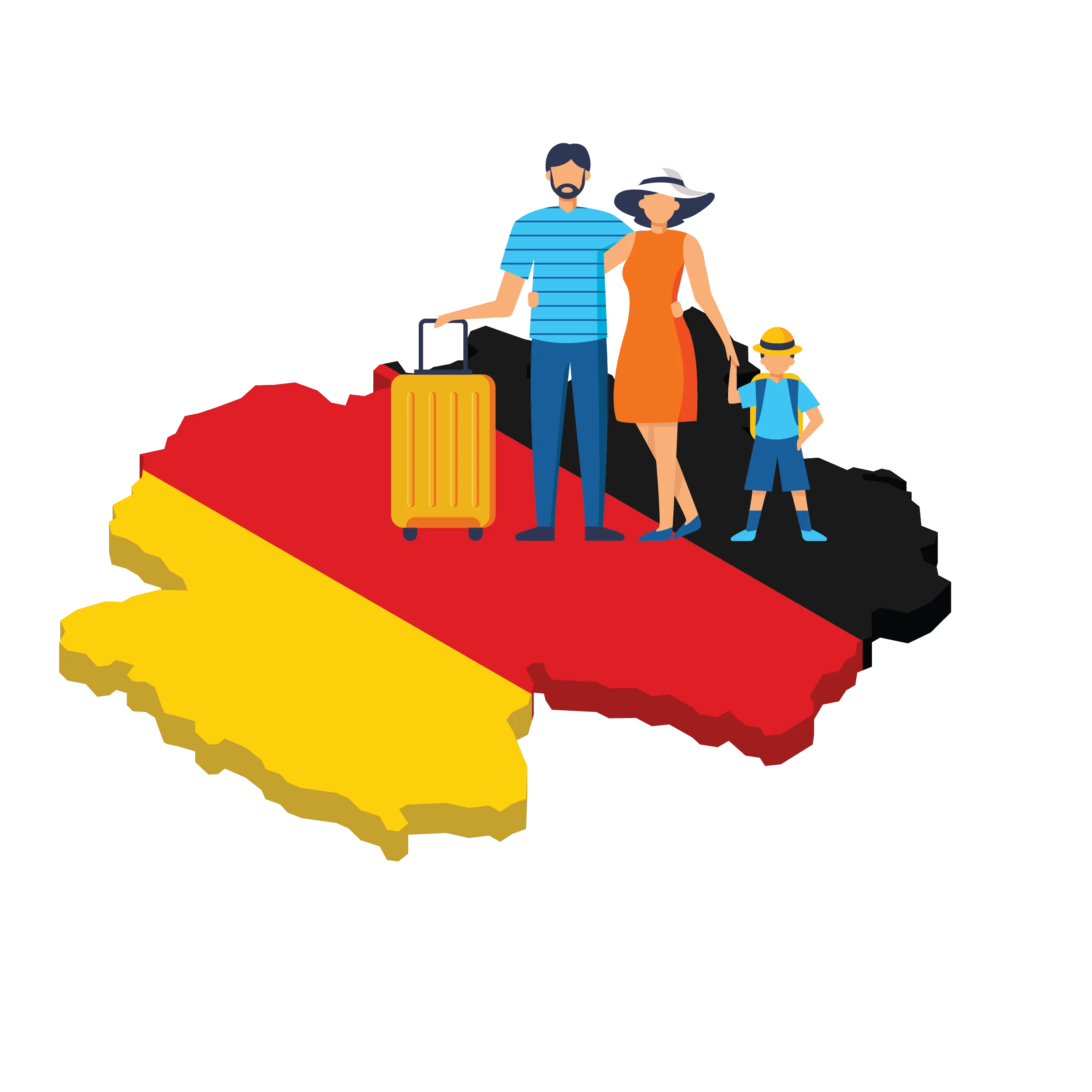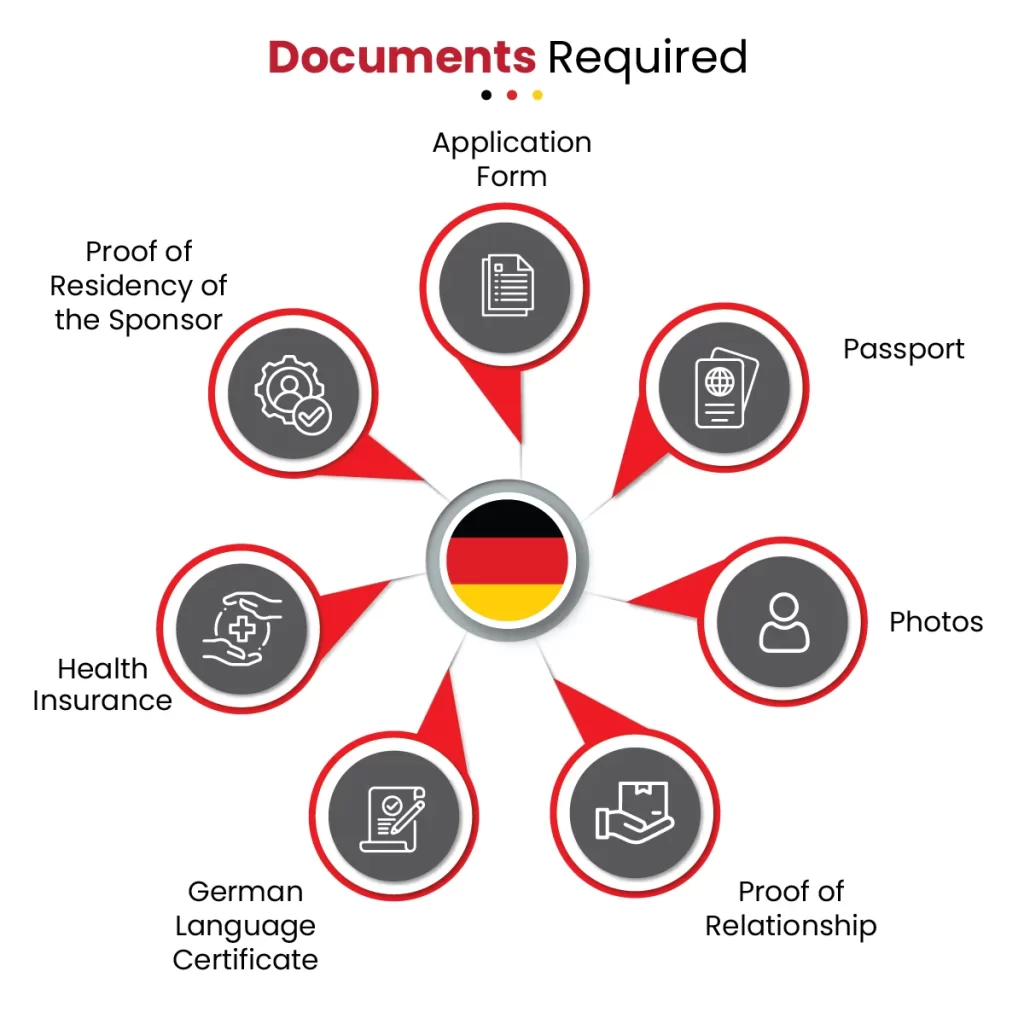Family Reunification Visa Germany

Get in Touch
Family Reunification Visa Germany
It is possible for citizens of countries outside Switzerland, the EU, or the EEA to bring their family members to Germany. There are specific rules that apply based on a family member’s nationality. A family reunification visa Germany, or Visum zur Familienzusammenführung allows family members of non-German residents, including non EU citizens, to join their family members already living in Germany.
This visa category can apply to spouses, minor children, and in some cases, parents.
What is a Family Reunification Visa for Germany
The family reunification visa for Germany is designed for non-residents of Germany who want to bring family members to Germany. A visa of this kind is necessary for keeping the family together and can be applied for by spouses, registered partners, minor children, and parents depending on the applicant’s situation and status in Germany.
Who Needs a German Family Reunification Visa
People from the European Union (EU), European Economic Area (EEA), and the European Free Trade Association (EFTA) do not need a special permit to live and work in Germany. They can even bring their family members with them. The only requirement is that they must have enough money to maintain themselves and their family and have a home that meets the German government’s standards.
However, if any family member is from a country outside of the EU, EEA, or EFTA, they must apply for a German Family Reunion Visa to join their relatives in Germany.
Here’s who can typically benefit from Family reunification visa in Germany :
1. Family Reunion Visa for Spouse
If a sponsor, who is a non-EU national residing in Germany, wants to bring their registered partner or spouse to join them, the following conditions must be met:
Residence Title Requirement: The primary applicant must hold a valid residence permit, settlement permit, or EU Blue Card for Germany.
Age Requirement: The spouse must be at least 18 years old.
Financial Stability: The primary applicant must demonstrate sufficient financial means and adequate health insurance coverage to support their family.
Proof of Relationship: A valid marriage certificate or registered partnership certificate must be provided.
Language Proficiency: The immigrating spouse or partner must demonstrate at least basic German language skills (usually at the A1 level).

2. Family Reunion Visa for Children and Parents
If you or your spouse have a legal right to reside in Germany, your children under the age of 18 can also obtain a temporary or permanent residence permit. Children who are citizens of an EU or EEA country do not need a visa and can live and work in Germany without restrictions.
For children from non-EU or EEA countries, a visa is typically required. Children under 16 can receive a temporary residence permit if their parents hold valid residence permits. Single parents can also apply for a visa for their children, provided they have the consent of the other parent with custody rights.
- The child must be under 18.
- The child must not be married, divorced, or widowed.
For children over 16, special conditions apply, and it’s advised to consult your local German embassy for guidance. Children over 18 usually need to apply for an independent residence title.
To obtain the visa :
Birth of a Child in Germany
A child born in Germany to parents holding valid residence permits will automatically be granted a residence permit under Section 33 of the Residence Act (AufenthG).
German Citizenship
Citizenship for children follows the principle of jus sanguinis (right of blood). If the child’s parent(any one of them) is a German citizen, the child will take on German citizenship upon birth. A person may obtain dual nationality in some cases.
Under specific conditions, parents or parents-in-law of skilled professionals who have received their residence permit for the first time after March 1, 2024, may be eligible to join their family in Germany. The immigration authorities will assess whether other family members can come based on the presence of particularly challenging circumstances that could impact the family’s well-being. This provision is designed to prevent severe hardship and support family unity when necessary.
These visas facilitate family unity and make sure that individuals can maintain close family bonds while residing in Germany.
Eligibility and Requirement for Reunion Visa
- For Spouses: The primary applicant must hold a valid residence permit, settlement permit, or EU Blue Card for Germany. The spouse must be at least 18 years old.
- For Children: Minor children (under 18) of individuals living in Germany are eligible. In some cases, children over 16 may need to demonstrate German language skills.
Documents required for family reunification visa for Germany

- Application Form: Completed online with VIDEX, and signed two copies of the form and declaration.
- Passport: Must be valid, issued within the past 10 years, and have at least 2 blank pages.
- Photos: Take 2 recent biometric passport size photos.
- Proof of Relationship: Marriage certificate for spouses or birth certificates for children.
- German Language Certificate: Spouses, if necessary, must provide proof of basic German skills (A1 level).
- Health Insurance: Proof you are covered by health insurance in Germany.
- Proof of Residency of the Sponsor: Residence permit or visa status of the family member residing in Germany.
Application Form for Family Reunion Visa Germany
To apply for a family reunion visa in Germany, applicants need to complete the appropriate application form, which can typically be found on the website of the German embassy or consulate in their home country. The form also includes very detailed information about the personal information and the relationship with the person and where the form seeks to see why you joined the family member in Germany.
Processing Time for Family Reunification Visa
The processing time for a family reunification visa varies depending on the embassy or consulate handling the application and the completeness of the provided documents. It can take from a few weeks to a few months on the average. Because these applications do take time, it is also recommended to begin the process in advance, as there will be no delay if applicants provide the required documents, such as proof of relationship and financial stability.
CanApprove Guide You in Applying for a Family Reunion Visa
At CanApprove, our team of Germany immigration experts can guide you through each step of applying for a family reunification visa Germany. We help with document preparation, form submission and extensive support when applying to ensure a smooth and more efficient admittance. For personalized help, insights and expertise with German immigration requirements, get in touch with us.
AUSTRALIA
- Australian PR Visa
- Australia Visitor Visa
- Partner Visa
- Subclass 485 Visas
- Subclass 189 Visa
- Subclass 476
- Subclass 500
- A complete guide to Skilled Independent Subclass 189 Visa
- Australia 65 Points Calculator
- Different Parent Visas in Australia
- Graduate Temporary Subclass 485 Visas
- Recognized Graduate Subclass 476
- Skilled Nominated Subclass 190
- Skilled Work Regional (Provisional) Subclass 491
Get in Touch
Just a few steps to get it started!
Frequently Asked Questions
How to apply for a Germany family reunion visa?
You can apply for a family reunion visa at the German Embassy or Consulate in your home country. You will need to submit documents like proof of relationship, proof of financial stability, accommodation details, and language proficiency (usually A1 level of German).
Can I work in Germany with a family reunion visa?
Yes, you can work in Germany with a family reunion visa, provided that your spouse or relative who resides in Germany holds a residence permit that allows them to work.
How to extend a family reunion visa in Germany?
You can apply for an extension of your family reunion visa by submitting a request at the local immigration office (Ausländerbehörde) in Germany. You will need to provide proof that your circumstances have not changed and that you continue to meet the visa requirements.
How to track family reunion visa applications in Germany?
You can track your visa application status through the visa application center’s online portal or by contacting the German consulate where you submitted your application.
What is the checklist for a family reunion visa in Germany?
Common checklist items include:
- Valid passport
- Proof of relationship (marriage certificate, birth certificate, etc.)
- Proof of income or financial stability
- Health insurance
- Proof of accommodation in Germany
- Language proficiency (usually A1 German)
- Completed visa application form and fee payment
Our Clients Review

Karthik

Mr. Timmy George








